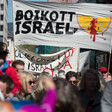The Electronic Intifada 31 May 2016

Construction in the Israeli settlement of Beitar Illit, built on land expropriated from the village of Wadi Fukin near the West Bank city of Bethlehem, September 2014.
ActiveStillsAmerica’s largest faith-based pension fund has invested in a number of firms seeking to profit from Israeli war crimes over the past four years.
Like many other religious organizations, the 12 million-strong United Methodist Church has formally criticized Israel’s oppression of the Palestinians. At a 2012 policy-making conference, the UMC appealed for a global boycott of goods produced in the settlements which Israel is building in the occupied West Bank in violation of international law.
The church’s own pension board, however, has failed to respect the spirit of that call. Since 2012, it has invested in a number of companies that are active in Israeli settlements.
At the beginning of this year, the pension board held investments in 23 Israeli companies.
They include the supermarket chains Rami Levy and Shufersal, the telecommunications firm Bezeq and the fuel distributor Delek. All of these firms have opened outlets in or provided services to Israel’s settlements in the West Bank.
The board has also invested in the Strauss Group, a firm that has given financial support to the Israeli military.
And it has bought shares in a number of weapons-makers — such as France’s Dassault, which is engaged in joint activities with the Israeli arms industry.
“Awkward position”
Such investments appear inconsistent with the UMC’s stated policy of avoiding investments that could assist human rights violations.
The Electronic Intifada has compared the pension board’s current investments with those held in 2012. Many of the Israeli companies that appear in the 2016 list of holdings do not appear in the 2012 list, indicating that many of those investments have been made within that period.
The Electronic Intifada asked the pension board to explain why it has continued investing in Israeli firms active in the West Bank. No comment was received from the board by the time of publication.
Susanne Hoder, a Methodist active in the Palestine solidarity movement, told The Electronic Intifada that “the church finds itself in the very awkward position of owning stock in companies in the illegal settlements after we’ve called on all nations to boycott products from companies in the illegal settlements.”
The construction and expansion of Israel’s settlements in the West Bank breach the Fourth Geneva Convention, which forbids an occupying power from moving its civilian population into the territory that it occupies. As such, Israel’s settlement activities amount to war crimes.
Several resolutions urging divestment from corporations involved in the Israeli occupation were proposed ahead of a recent Methodist conference in Portland, Oregon. Those resolutions encountered stiff opposition from an internal church finance committee. As a result, some of the resolutions did not go to a general vote.
The position of the financial committee was at odds with previous decisions taken by the church. The church had already taken steps in the recent past to divest from some Israeli companies.
Last year, the church’s pension board announced that it had excluded Elbit, a leading supplier of drones to the Israeli military, and several Israeli banks from its investment portfolio.
Hoder argued that the December decision by the pension board was “unprecedented in the fact that it dealt with banks that fund the occupation as opposed to specific companies that profit from it.”
Those companies were excluded from the board’s portfolio after the pension board commissioned a screening of its investments to identify firms implicated in human rights abuses.
Palestine solidarity activists were hoping to build on that achievement by having a more explicit commitment to divestment from firms aiding Israel’s human rights abuses approved by the Portland conference.
Pressure
Palestine solidarity campaigners say that the church has come under intense pressure from pro-Israel lobby groups to back away from its efforts to cut ties with occupation-linked firms.
Delegates attending the Portland conference reported having received personal phone calls from Israeli consular staff in various US cities. International delegates received similar pressure from Israeli diplomats in their home countries.
“We know they [the pro-Israel lobby] have a large fund set aside for defeating anything related to divestment and boycott,” said Hoder. “And we feel that they made use of that.”
Hoder is a co-chair of the United Methodist Kairos Response. That group was formed to support a 2009 call by Palestinian Christians for a boycott of Israel, a document known as the Kairos Palestine statement.
After various pleas to support boycott and divestment measures were issued by Methodist groupings in different parts of the US ahead of the Portland conference, it became apparent that a finance committee wished to reject them, Hoder said.
Several members of the pension board sit on that committee. Other members of the committee were known to be sympathetic towards Israel. Activists told The Electronic Intifada that at least one member argued that it was inflammatory to use the terms “Palestine” or “occupied territories.”
Just days before the conference, presidential contender Hillary Clinton released a letter slamming the Palestinian call for boycott, divestment and sanctions against Israel. Addressed to the leaders of major Israel lobby organizations, it did not directly mention the Methodist Church.
But the target was obvious.
Clinton repeated well-worn Israel lobby talking points, accusing the BDS movement of being “counterproductive” and “harmful to Israelis and Palestinians alike.”
“Hillary Clinton’s letter was only one of the indications that any Methodist was being lobbied on BDS issues,” Jonathan Kuttab, a human rights lawyer who followed the Portland conference, told The Electronic Intifada.
Although the Portland conference was something of a setback, Palestine solidarity activists in the church believe they can build on the progress they have already made.
While the vote on boycott and divestment was blocked, the conference did approve a resolution saying that Methodists should “seriously consider using nonviolent economic means when appropriate and effective” to support struggles by indigenous peoples around the world. It also opposes all efforts by governments to suppress the use of such means.
That statement could potentially be useful in fighting the attacks on the BDS movement by Israel and its allies.
Other resolutions approved by the conference focus on Israel’s unjust policies regarding water access and land rights. One highlights the destruction of fruit trees by Israeli forces in the West Bank village of Wadi Fukin.
Many participants in the conference recognized that Palestinians are victims of colonialism. Japanese Americans who had survived the internment camps of the Second World War, Native American and African activists drew parallels between Israel’s treatment of the Palestinians and the ethnic cleansing inflicted on other indigenous peoples.
“We had indigenous people from many parts of the world who were drawing parallels between their own experiences of colonialism and dispossession and the experience of the Palestinians today,” said Hoder.
Alex Awad, a Palestinian who spent more than 20 years as a UMC missionary, said, “We did not get all that we wanted or hoped for. But we are very thankful and encouraged for the powerful resolutions that came out of the conference in support for Palestinian rights.”
“The positive side is that United Methodists have been educated through the process,” Awad added. “While United Methodists are agonizing over these issues, other churches are not willing even to discuss them.”
Additional reporting by David Cronin.
Ryan Rodrick Beiler is a freelance photojournalist and member of the ActiveStills collective who lives in Oslo, Norway.





